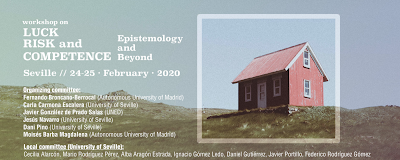Luck, Risk and Competence
I was invited to talk about my book on luck this week in Sevilla as part of this wonderful workshop. It was a great experience and I am very thankful for the organizers. After hearing and discussing topics related to luck and risk, specially from an epistemological perspective, here are some of my main conclusions:
- Rejecting a philosophical theory because of a thought experiment that seems to provide counter-examples is not good practice.
In general, thought experiments ought to be complemented by – turned into, I would say – rigorous theorising, modelling and argumentation. - Epistemic risk is not a genuine phenomenon (at least not different from probability or other already well established epistemic notions).
However, the theoretical tools developed for the study of epistemic risk are still epistemically valuable for other purposes. - Except, perhaps, for truth (and very closely related notions),
all central epistemic notions are modal. - The relevant uncertainty in normativity is itself normative.
- There is no good/bad luck without someone being lucky/unlucky.
- There is some merit in being competent enough to perform even in the most dangerous of situations.
- Fake barn scenarios are so different from traditional Gettier cases that it makes better sense to say that
agents in fake barn situations are not actually justified.



Comentarios
Publicar un comentario